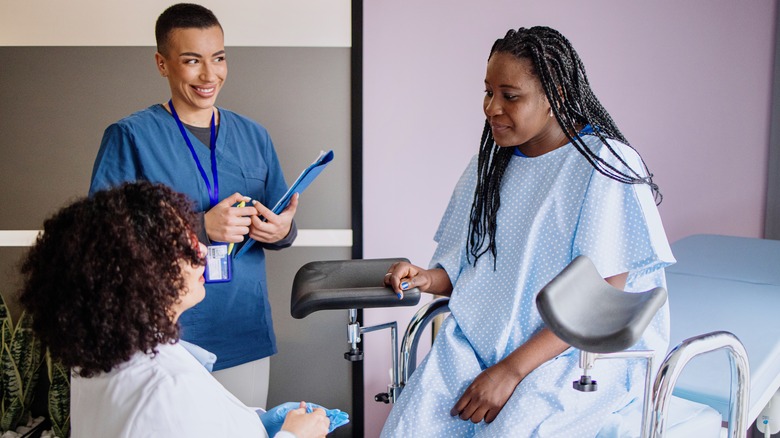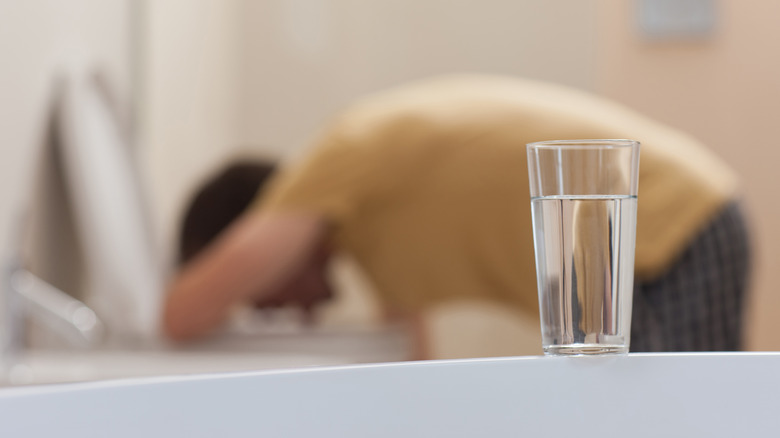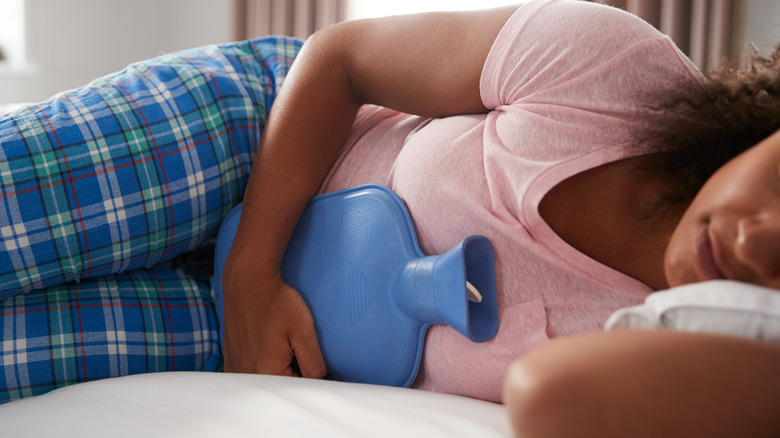Signs You May Have An (All Too Common) Ovarian Cyst — And Where To Go From There
Even though most of us have heard of ovarian cysts, it can still be a scary topic to approach, especially if you're worried you might be dealing with one. Ovarian cysts are small sacs filled with fluid that form in, or on, your ovary. Despite how serious that sounds, they are actually quite common (it's estimated that 10 out of every 100 people with uteruses have them) and usually go away on their own. In fact, most ovarian cysts don't cause symptoms, so you might not have realized if you had one in the past.
However, for some, large or clustered ovarian cysts can lead to troubling side effects. From irregular periods to pelvic pain, ovarian cysts can be indicators of other, more serious health concerns. Polycystic Ovarian Syndrome or Endometriosis can both lead to ovarian cysts that affect fertility, so it's important to speak with your doctor if you're concerned about unusual symptoms. If you're not sure what symptoms qualify as unusual, let's explore some of the common signs that you might be dealing with an ovarian cyst.
You're experiencing pain
Many people suffer from mild PMS cramping and pain during their menstrual cycle. In fact, according to the American College of Obstetrics and Gynecology, more than half of all people who menstruate experience pain for 1-2 days each cycle (also called dysmenorrhea). With that being said, pelvic pain that's more than your normal level can be an indicator of ovarian cysts. Even though it can be difficult for some to separate normal period cramping from more serious pelvic pain, paying attention to the intensity and length of pain can help you recognize if something's unusual. For instance, if you're experiencing cramping pains or a dull throb outside of your menstruation it could be a sign of a cyst. Additionally, if your pain level becomes sharp and excessive, you should immediately head to your closest medical facility since ovarian cysts can rupture, and even break open, requiring immediate medical attention.
It's also important to notice where the pain is coming from. If your cramps are typically in your lower abdomen and you suddenly start feeling pain in your lower back or thighs, it could be worth a visit to your doctor to make sure something more serious isn't happening. In addition to menstruation pain, painful bowel movements and even pain during sexual intercourse can also be signs of a problem.
Bloating or swelling
If your abdomen seems more bloated than usual or you see unusual swelling on one side of your abdomen, that could be a sign that one of your ovaries is swollen. Ovaries naturally swell during your menstrual cycle (specifically as part of ovulation) in preparation to release an egg. However, cysts can also cause this kind of swelling. This is especially true if you're noticing swelling or bloating outside of your normal menstrual cycle.
Cysts (especially larger ones) on your ovaries can push against your bowels and even your bladder. This can cause a feeling of pressure or bloating which not only can lead to a swollen abdomen, but can also lead to pain when urinating. Another concern with larger cysts is that the weight of the cyst can actually pull on your ovary, which can cause twisting and cramping pain. This is called ovarian torsion and constitutes a medical emergency due to the risk of blood supply loss, and the potential permanent damage to your ovary and/or fallopian tube.
Nausea and/or vomiting
Nausea, vomiting, and dizziness can also be signs of ovarian cysts. This is especially true if these symptoms accompany unusual or excessive pain. Sharp pain from a cyst rupturing, bursting, or causing ovarian torsion can cause sudden lightheadedness and weakness. These are all signs you need immediate medical attention.
However, nausea on its own is less concerning. Just like with pain during your menstrual cycle, it can be difficult for some to tell these symptoms apart from their normal menstrual experience. This is especially true since one of the more common symptoms of menstrual pain (dysmenorrhea) is nausea and/or vomiting. If you're someone who deals with nausea as part of your monthly cycle, it's not always a red flag to experience it during menstruation. This makes it especially important to keep track of your baseline menstruation symptoms as a way to track if something unusual is happening.
How to manage ovarian cysts
While there isn't a foolproof way to prevent ovarian cysts, knowing these early signs can better prepare you and ensure you recognize when and if something is wrong. Being quick to respond to symptoms can ensure you don't face more serious health outcomes in the long run. However, while many of these symptoms can be indicators of more serious problems, for some people these symptoms can simply be a more regular part of their menstrual cycle. Only you can know your own body and recognize if something feels off.
If you do discover you're dealing with ovarian cysts, there are many different ways (medical and surgical) to manage and treat the issue depending on severity. The good news is that, for most people, ovarian cysts will shrink on their own in a few months, and the only thing to do is get regular checkups and manage your symptoms. In that case, the best home remedy is a familiar one: heating pads. Heating pads can be a great way to get some much-needed relief if you're dealing with cramping, bloating, or pain as a result of ovarian cysts.
Making sure you regularly see your OBGYN is the most important thing you can do if you suspect you might be dealing with ovarian cysts. Pelvic exams and ultrasounds can be key in diagnosing cysts (or other, more serious diagnoses), so let your doctor know immediately if you suspect something is wrong.




